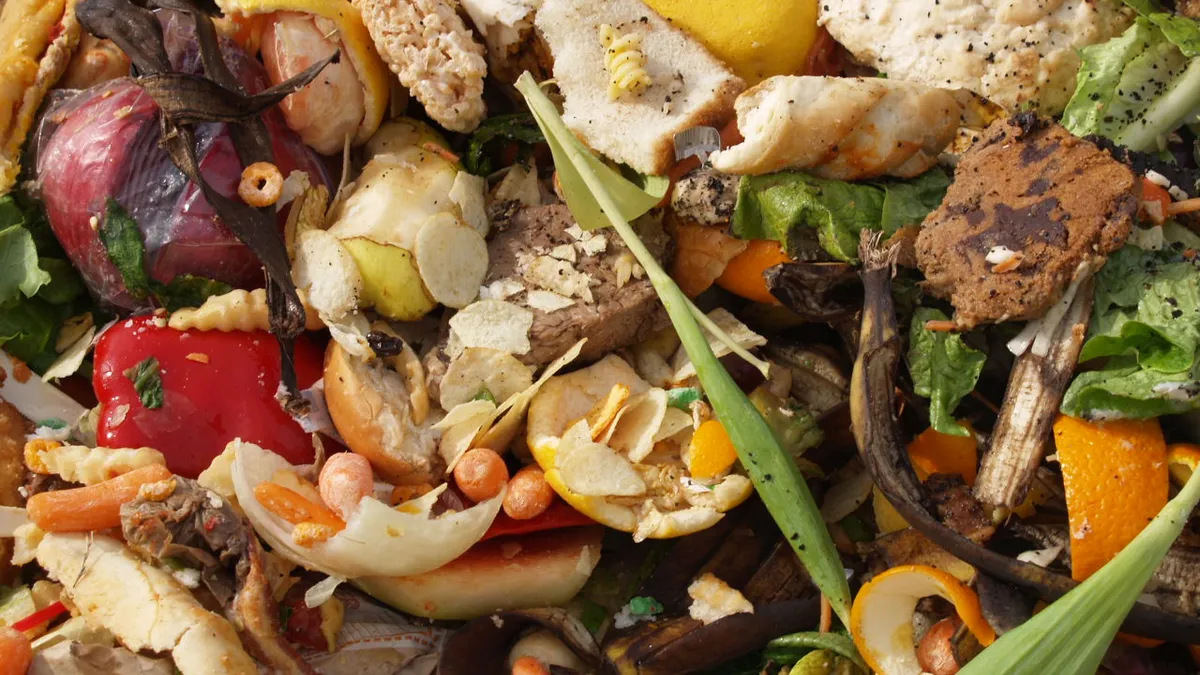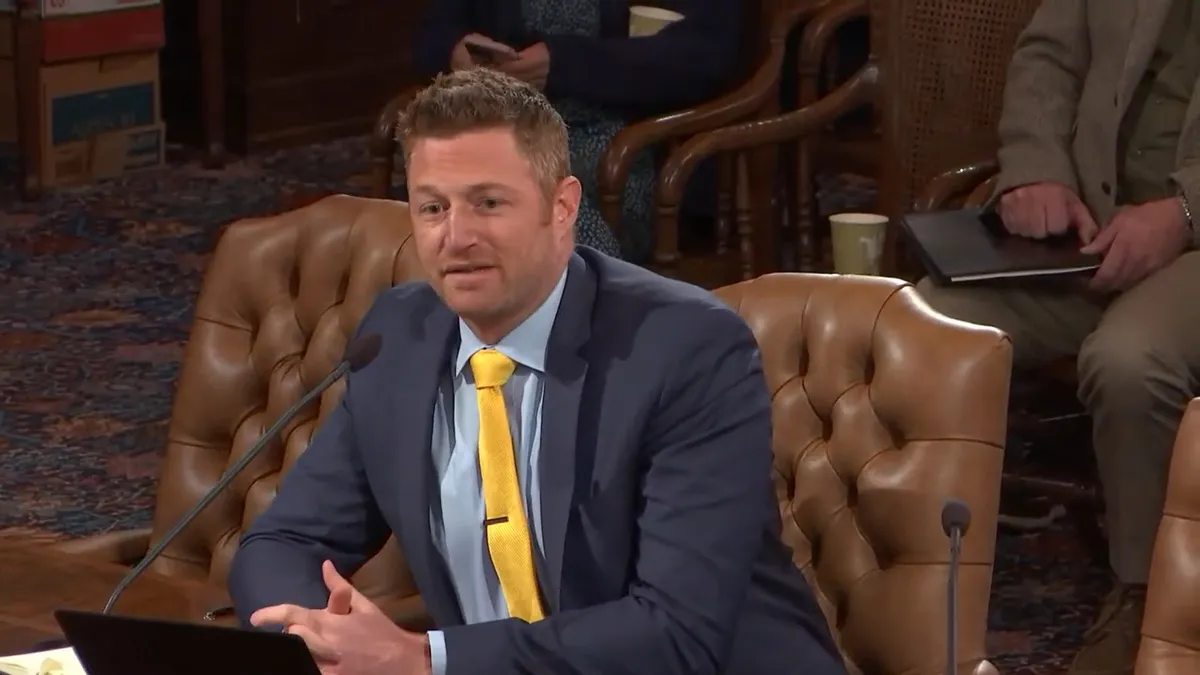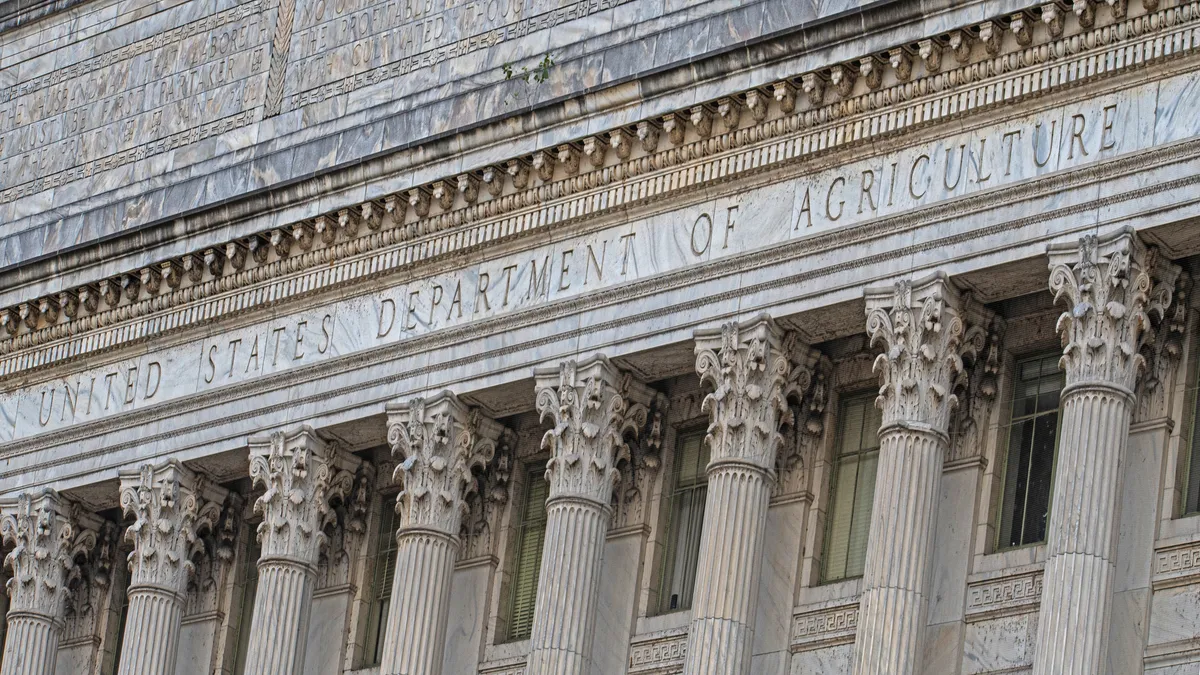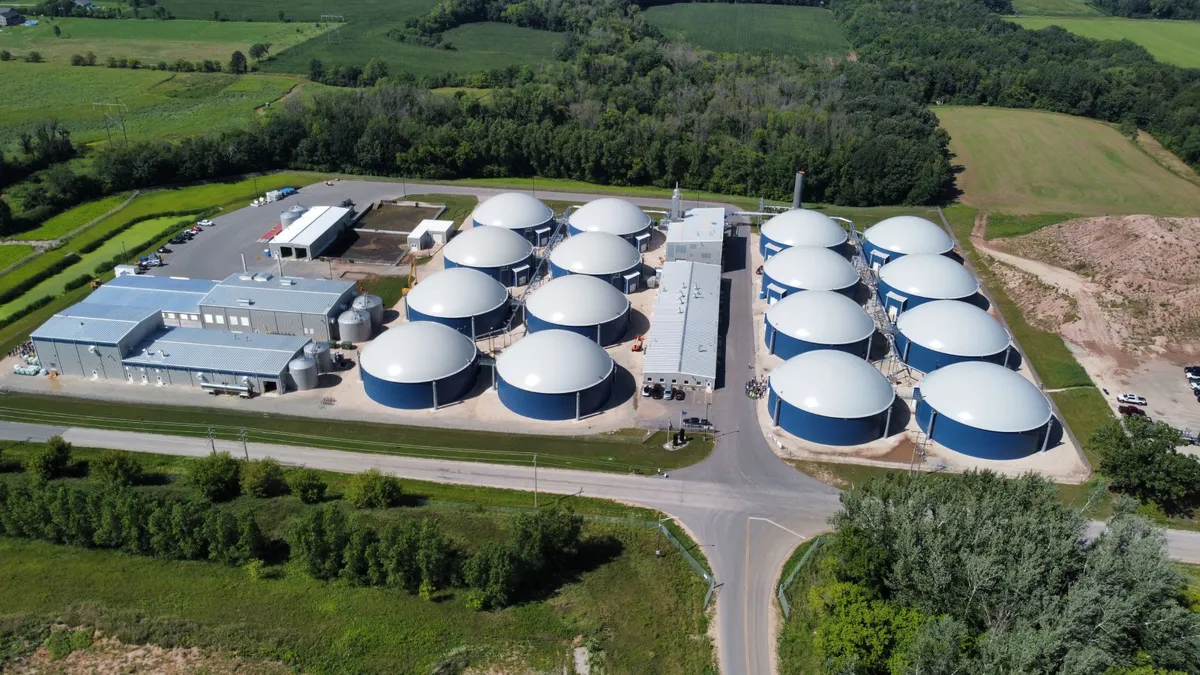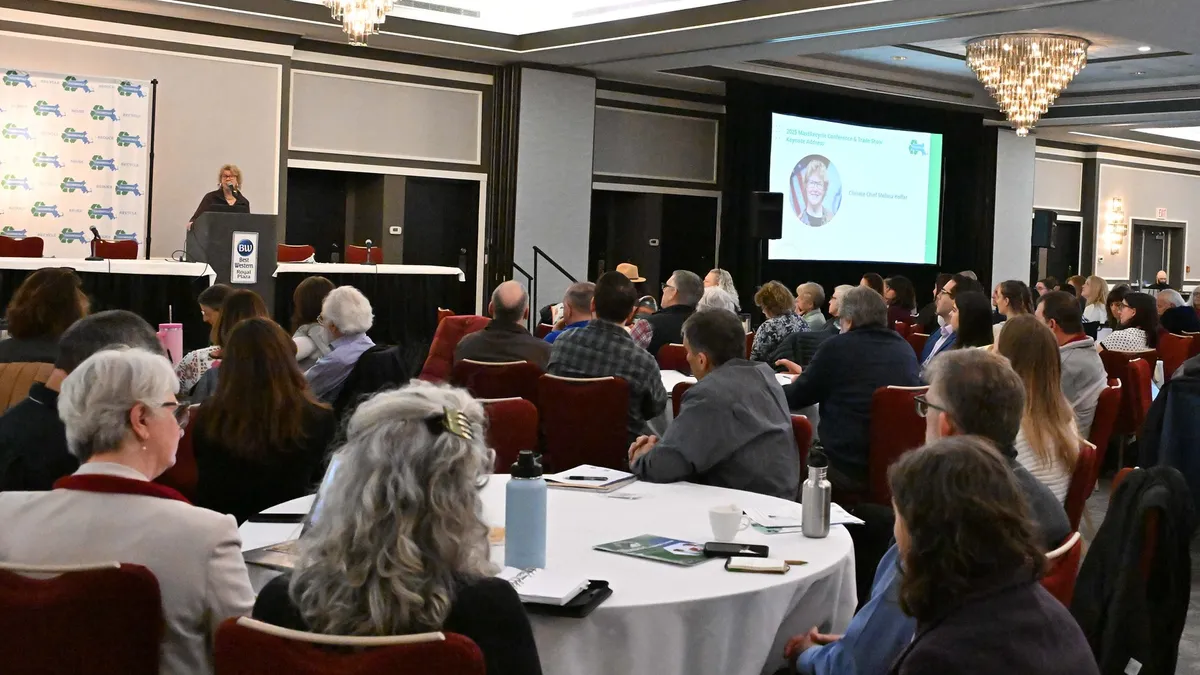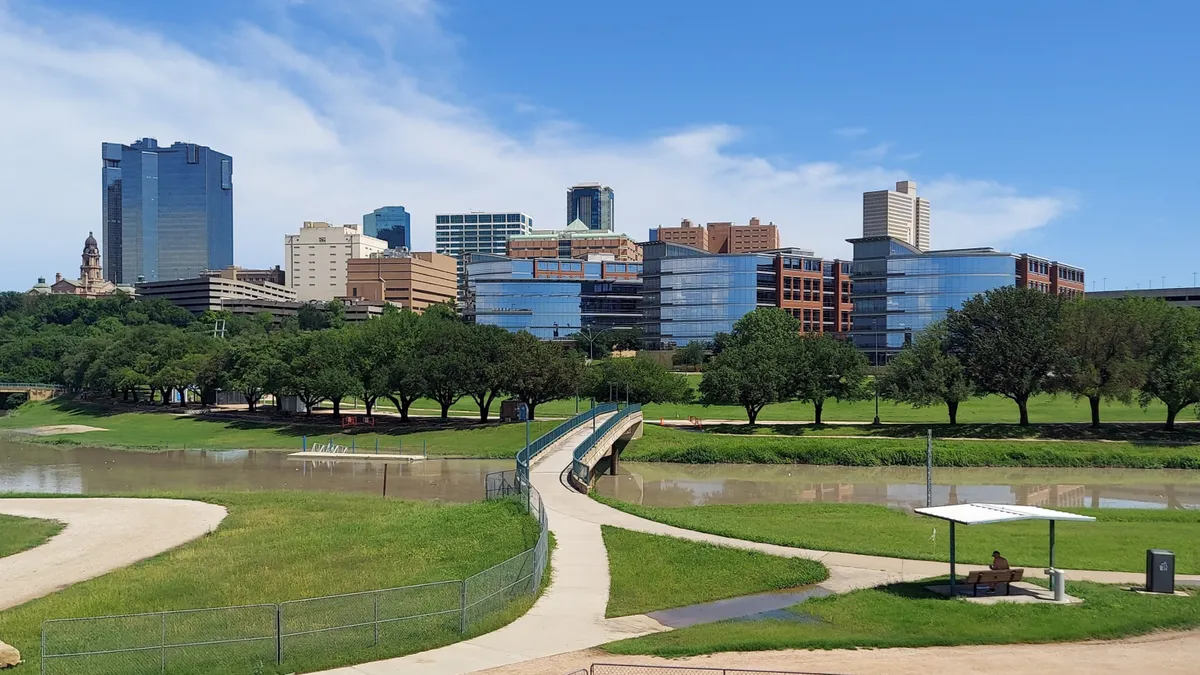UPDATE: April 15, 2020: Gov. Phil Murphy signed A2371, a bill requiring large establishments to separate food waste for recycling, on Tuesday.
What actually counts as food waste recycling, and who controls the infrastructure behind it, remains a topic of intense debate in New Jersey even after a potentially decisive vote last week.
The New Jersey Senate passed the latest version of a long-fought organics diversion bill (A2371) on Thursday. If signed by Gov. Phil Murphy, it would require establishments generating one ton or more of food waste per week to arrange for separate recycling if an authorized processing facility is within 25 road miles. Additionally, the bill would designate food waste recycling facilities as "Class I renewable energy" and establish a Food Waste Recycling Market Development Council. It would also direct state agencies to use compost and soil products in transportation projects when feasible.
Murphy's office told Waste Dive it does not comment on pending legislation. The bill's proponents are optimistic because the language aligns with the conditional veto of a prior version, in which Murphy said landfills with gas-to-energy systems (LGTE) and incinerators should not be counted as authorized organics recycling options. LGTE backers still believe they have a path forward even if the bill is signed.
While a discussion over LGTE versus anaerobic digestion or composting has been playing out in the broader waste industry for years, it has been especially relevant in New Jersey where many counties own and operate disposal sites. All of this has made for one of the more unique and contentious state organics policy debates in the country.
If enacted, A2371's requirements would take effect within 18 months. New Jersey would join California, Connecticut, Maryland, Massachusetts, Minnesota, New York, Rhode Island and Vermont in having some form of organics recycling policy.
Years in the making
Following multiple stalled attempts in recent years, the New Jersey legislature passed a version of this bill for the first time last spring only to see it vetoed by Murphy over the exemption issues. A new bill without the exemptions advanced in December, but failed to pass before the previous legislative session ended in January.
Sen. Bob Smith vowed to bring the bill back and he maneuvered it to the Senate floor without going through a committee vote after it passed the Assembly in February. Sen. Paul Sarlo, chair of the budget committee that was skipped over, called it a "very, very silly bill and not practical" before unsuccessfully attempting to pass a floor amendment reinstating the LGTE exemption.
“Change is hard," said Smith from the floor, pushing back on critiques from Sarlo and others. “We have to do everything we possibly can to turn around the global climate change that’s rushing at us now."
One concern that came up during the debate was where new facilities might be sited, with Smith recognizing there are environmental justice factors and Senate President Steve Sweeney agreeing to take up a related bill at a later date. A2371 ultimately passed by a vote of 22-17.
"Many senators rose today to ensure that environmental justice is considered as the organics industry expands investments in green jobs and facilities within the state. We support that goal and hope to work with them to make that a reality," said New Jersey Composting Council President Jairo Gonzalez in a celebratory email to supporters following the vote.
Other groups also heralded its passage, touting expected environmental benefits.
"Governor Murphy must sign this bill quickly. As we move toward getting to zero carbon, we need to move towards getting to zero food waste," said New Jersey Sierra Club Director Jeff Tittel in a statement that also questioned classifying biogas from digesters as renewable.
Patrick Serfass, executive director of the American Biogas Council, pushed back on that notion, telling Waste Dive that “organic material is renewable and will be perpetually produced," while also noting the potential for expanded infrastructure to help avert emissions from farming and agricultural sources.
New Jersey currently has a handful of commercial-scale food waste processing facilities – including the Trenton Biogas digester, Waste Management CORe pre-processing site and AgChoice windrow composting operation. Supporters hope this bill will attract further development.
Serfass pointed to the increasing number of states with organics recycling policies as a sign this was part of a trend. As for whether LGTE should be considered equivalent to digestion, he emphasized that biogas from landfills is important but generally disagreed with the characterization.
"[T]he highest and best use of organic material like food waste is digesting it, because you’re going to have a more complete conversion to biogas and you’re also going to be able to recycle your nutrients and create a soil product as a result."
Opponents do not agree, largely because many New Jersey counties rely on landfill tip fee revenues and have also invested in LGTE systems.
An opposition letter from New Jersey Association of Counties Executive Director John Donnadio cited concern "that without the LGTE exemption, this legislation would divert critical volumes of decomposing organic food waste from county LGTE facilities, which would adversely affect the quantity and quality of gas relied upon and ultimately jeopardize their economic viability."
The letter named nine counties in this position and raised other issues such as potential recycling compliance costs for healthcare facilities. The bill authorizes New Jersey's Department of Environmental Protection to grant waivers if the cost of organics recycling is more than 10% higher than the cost of traditional disposal. February analysis from the state's Office of Legislative Services (OLS) found data was inconclusive on how these costs might play out, or which counties might be initially covered by the law, for a wide range of factors.
Next steps
Smith estimated landfills could see 15% of their inbound food waste volumes diverted and the OLS analysis did recognize operations would be financially affected in some cases. How substantial that cost might be, or how quickly change might occur given current gaps in organics processing infrastructure, remains unclear.
The Ocean County Landfill Corporation (the state's sole private landfill operator), which has been a key player, submitted a litany of concerns ahead of the vote. “Jeopardizing in-place environmentally beneficial LGTE facilities representing substantial public and private investments to promote an untested alternative does not appear to be a sound public policy," it concluded.
Theodore Schwartz, a partner at the law firm Scarinci Hollenbeck who represents the company, reiterated those claims to Waste Dive. He cast doubt on the reliability of organics processing, noting that new facilities might open and divert volume from landfills – causing financial issues – before possibly closing in the future. "All they’re trying to do here is promote an industry at the expense of the LGTE facilities and all the public dollars that have gone into building these facilities," he said.
Schwartz hinted new legislation could be introduced to enact a LGTE exemption even if Murphy signs the bill. “This isn’t over," he said. "The vote was very close."
“We’re cautiously optimistic at this moment that it’s now in the governor’s hand. This is the first start of a long process, because there’s not facilities ready to pop up in New Jersey," Marie Kruzan, executive director of the supportive Association for New Jersey Recyclers, told Waste Dive.
Kruzan hopes the market development council could help address infrastructure gaps, for example by making it easier for municipalities to partner with higher education institutions that already have on-site processing capacity.
Sen. Smith's office did not respond to a request for comment about the possibility of a new LGTE exemption bill. Kruzan hasn't ruled anything out based on the complex route this debate has taken over the years.
“I know there is a strong sense in the landfill counties and they’ve been that way from the beginning," she said. "So we shall see what happens."



